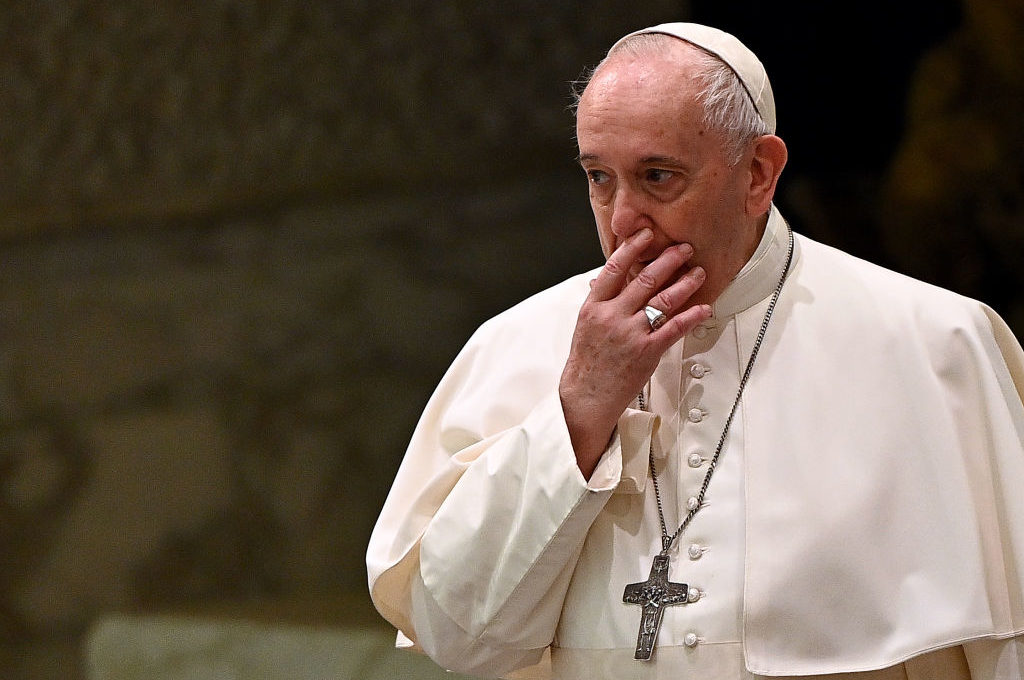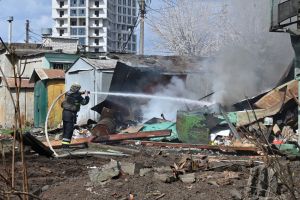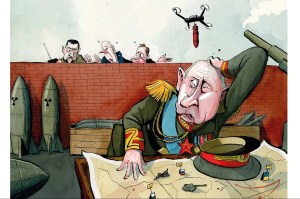On February 25, the day after Russia invaded Ukraine, Pope Francis met with Aleksandr Avdeyev, Russia’s ambassador to the Holy See. Yet rather than summoning Mr. Avdeyev to the Vatican, Francis called at the Russian embassy, just two blocks from the Castel Sant’Angelo.
The visit was a violation of diplomatic protocol. Heads of state don’t just pop ‘round to the local embassy.
Over the next couple of days, it became clear that Francis wouldn’t be paying the same honor to Ukraine’s ambassador. Even more strikingly, Francis refused to condemn Russia for the attack. Vatican-watchers fumed.
On February 28, the Vatican’s secretary of state released a video condemning the conflict “unleashed by Russia against Ukraine.” And while Cardinal Pietro Parolin insisted that “the military attack must stop immediately,” he added, “I am convinced that there is always room for negotiation.”
To this day, Francis still hasn’t officially blamed Russia for the attack, and Vatican-watchers are still fuming. “It is time for Francis to speak the truth about the murderous assault on Ukraine,” declared the National Catholic Reporter, a bastion of Catholic progressivism.
What is Francis thinking?
Russia’s invasion of Ukraine threatens two major long-term goals of Francis’s papacy. The first is a total diplomatic thaw between the East and the West. The other is reconciliation between the Catholic and Orthodox churches.
Most of us still associate Vatican diplomacy with the hardline anticommunism of John Paul II. Yet John Paul was actually a break from the norm. Popes haven’t held any real political power since Pius IX lost the Papal States in 1870. As the West became increasingly secular, their moral authority diminished as well.
To this day, the Holy See is a sovereign nation. On the one hand, it has diplomatic relations with over 180 countries and a permanent observer at the United Nations. On the other, its total area is less than 0.2 square miles and it has an official population of less than 500, most of whom are middle-aged clerics. With no army of its own, and no more kings willing to answer its deus vult, the Vatican’s diplomatic influence rests solely on its prestige. Which is considerable.
This new policy had middling results in World War II. On the one hand, Pius XII declared the Vatican’s official neutrality. On the other, this allowed them to help Nazi victims escape to the West. Then, during the early years of the Cold War, Pope Paul VI embraced Ostpolitik, aiming to avoid nuclear war by making peace between the East and West.
Many on the right criticized Paul for being too soft on communism — just as the left had accused Pius of being too soft on fascism. And maybe they were right. But at least they were consistent.
As soon as Francis became Pope, he made clear that the Holy See would abandon John Paul’s more aggressive style and return to the ideals of Ostpolitik. Hence Francis’s friendly (some would say too-friendly) relationships with both Russia and China.
In fact, after Cardinal Parolin visited Moscow in 2017, Ambassador Avdeyev told the press that Russia and the Holy See enjoy “a high level of mutual trust and a great harmony on many issues.” Pope Francis is “very esteemed and loved by the citizens of my country,” he declared. Which may or may not be true.
Meanwhile, Francis has been almost reckless in his efforts to heal the Catholic/Orthodox schism, which will reach its 1,000th anniversary in 2054.
In 2019, he gave certain relics of St. Peter to Bartholomew I of Constantinople, the Ecumenical Patriarch and nominal head of the Orthodox churches. Many Catholics were outraged. Peter was Bishop of Rome, and St. Peter’s Basilica — the mother church of Roman Catholicism — is built over his tomb. Francis himself is the 266th successor to St. Peter. Clearly, Francis believes quite strongly that Catholics and Orthodox should be reconciled.
A few years earlier, Francis signed the so-called Havana Declaration with Kirill, the Russian patriarch. The declaration also angered many Catholics for its remarks about Ukraine, which urged “all the parts involved in the conflict to prudence.”
Was that more Ostpolitik? Or does Francis give some credence to the idea that NATO has been provoking Russia by courting Ukraine? We can’t say for sure, though it may be worth noting that Francis enjoyed friendly relations with both Fidel Castro and Hugo Chávez.
Francis has never disguised his distrust of American power. He sees the United States as a consumerist empire, showering the planet with bombs and Big Macs. If his friend Ambassador Avdeyev were to frame Russia as a victim of US aggression, he may win Francis’s sympathy.
The key to understanding the Pope is this: Francis is deeply, fundamentally convinced that nobody really disagrees with anyone else. All conflict is a result of misunderstanding. All wars are perfectly avoidable. If anyone is cruel to anyone else, it’s because they choose to be.
Which is quite true, at least from a Christian perspective. But there’s a case to be made that Francis, though earnest, is rather naïve. Shortly before Russia’s invasion, the Pope said, “Let’s not forget, war is madness.” He believes that literally. And that may explain why he’s not a very effective diplomat.
Before the fighting started, Francis was also making plans to visit Kirill in Moscow, “to talk to a brother.” “There is no need for protocols,” Francis said, “A brother is a brother before all protocols,” even when they’re “a bit divided.” Well, it’s more than a bit. If the Holy Father can’t see that, he may squander any chance he has to do real good for Ukraine, for Russia — for the world.
Michael Warren Davis is author of The Reactionary Mind (Regnery, 2021) and The Times Are Wretched (Sophia Institute Press, 2024). Subscribe to his newsletter, “The Common Man.”


















